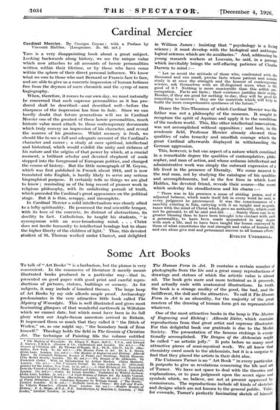Cardinal Mercier
Cardinal Mercier. By Georges Goyau ; with a Preface by Viscount Halifax. (Longmans. 3s. 6d. net.) Tins is a very disappointing book about a great subject. Looking backwards along history, we see the unique value which now attaches to all accounts of heroic personalities written within their lifetime, or by those who have come within the sphere of their direct personal influence. We know what we owe to those who met Bernard or Francis face to face, and are able to give us a concrete impression of human holiness free from the dryness of mere chronicle and the syrup of mere
• hagiography.
When, therefore, it comes to our own day, we must naturally be concerned that such supreme personalities as it has pro- dueed shall be described—and described well—before the sharpness of the impression has time to fade. Since we can hardly doubt that future generations will see in Cardinal Mercier- one of the greatest of these heroic personalities, much historic value must attach to those contemporary documents which truly convey an impression of his character, and reveal the sources of his greatness. Whilst memory is fresh, we should like to see a full and adequate account of the Cardinal's character and career ; a study at once spiritual, intellectual and historical, which would exhibit the unity and richness of his nature and the origins of that power by which, at a crucial moment, a brilliant scholar and devoted shepherd of souls stepped into the foreground of European politics, and changed the course of history. But the little monograph of M. Goyau, which was first published in French about 1918, and is now translated into English, is hardly likely to serve any serious biographical purpose. It certainly tells us things we are glad to know ; reminding us of the long record of pioneer work in religious philosophy, with its unfaltering pursuit of truth, which preceded the Cardinal's great appearance on the political stage. But it is thin, scrappy, and incomplete.
In Cardinal Mercier a solid intellectualism was closely allied to a lofty spirituality. He possessed the real scientific temper, with its love of the concrete, its distrust of abstractions, its docility to fact. Catholicism, he taught his students, " is synonymous with an ever-broadening mind. . . . Christ does not invite humanity to intellectual bondage but to share the higher liberty of the children of light." Thus, this devoted Student of St. Thomas worked under Charcot, and delighted
in William James : insisting that " psychology is a living science ; it must develop with the biological and anthropo. logical sciences which are its auxiliaries." And, addressing his young research workers at Louvain, he said, in a passage which inevitably brings the self-effacing patience of Charles Darwin to mind :— " Let us avoid the attitude of those who, confronted with the thousand and one small, precise facts whose patient and minute study is at once the strength and the honour of contemporary science, ask themselves with an ill-disguised scorn what is the good of it ? Nothing is more unscientific than this selfish pre. occupation. Facts are facts ; their existence justifies their study. Besides, if they are good for nothing to-day, they will be good for something to-morrow ; they are the materials which will help to build the more comprehensive syntheses of the future."
Hence the Neo-Thomism of which Cardinal Mercier was the father was not a philosophy of the museum. It sought to recapture the spirit of Aquinas and apply it to the conditions of the modern world. This, like other intellectual innovations, was not accomplished without opposition ; and here, in the academic field, Professor Mercier already showed those qualities of calm tenacity and unselfish courage which the
great Cardinal afterwards displayed in withstanding the German aggression.
This, however, is but one aspect of a nature which combined in a remarkable degree the qualities of contemplative, philo-
sopher, and man of action, and whose arduous intellectual and administrative work was simply the outward expression of a life lived in the presence of Eternity. We come nearest to the real man, not by studying the catalogue of his qualities and accomplishments, but in the few lines in which Lord Halifax, his devoted friend, . reveals their source—the secret which underlay his steadfastness and his charm :- " There was in his presence a sense of abiding peace, and of adjusted balance, which made itself felt in every word he said, in every judgment he pronounced. It was the consciousness of sanctity existing in him, carrying with it an insight and acquain• Lance with the mind of Christ which gave an authority, which could not be gainsaid, to all he said and did. . . . Surely there can be no greater blessing than to have been brought into contact with such a personality, to have been made acquainted in any degree with such a life, and to have been taught the' lesson conveyed by them of what constitutes the real strength and value of human life, and can alone give real and permanent success to all human effort."
EVELYN UNDERHILL.






























































 Previous page
Previous page